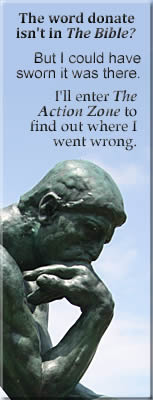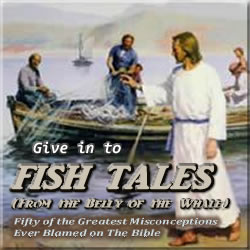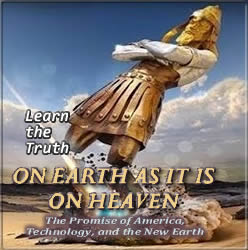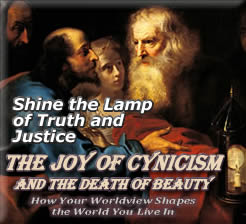The Next Paradigm Shift (Cont’d)
A Different Way of Seeing (Cont’d)
The Swiss theologian and author Hans Küng has applied Thomas Kuhn’s theory of change to the entire history of Christian thought so that for Küng a paradigm shift is what occurred with both the Protestant Reformation and the Age of Enlightenment. Speaking about this kind of radical change in the field of theology, Küng described it this way:
In theology … from time to time, there are drastic changes … As in the change from the geocentric to the heliocentric theory, from phlogiston to oxygen chemistry, from corpuscular to wave theory, so also in the change from one theology to another: Fixed and familiar concepts are changed; laws and criteria controlling the admissibility of certain problems and solutions are shifted; theories and models are upset.
In a word, the paradigm, or model of understanding, is changed, together with the whole complex of different methods, fields of problems, and attempted solutions as had previously been recognized by the theological community. The theologians get used, as it were, to a different way of seeing things, to see them in the context of a new model. Some things are now perceived that were not seen formerly, and possibly some things are overlooked that were formerly noticed. A new view of man, world, and God begins to prevail in the theological community, where the whole and its details appear in a different light.1
From this, it also follows that for a paradigm shift to occur there must be a considerable accumulation of information and experience to elicit such a change, all of which, as one can imagine, can only occur through the coordinated efforts of committed individuals over the span of several decades. In rare cases, the onset of a paradigm shift can be noted with a fair amount of accuracy, as with the Reformation, which is generally dated from 1520, and is widely attributed to the influence of one man, Martin Luther, and one document, his Ninety-Five Theses that he nailed to the church door in Wittenberg. More often than not, however, there is little consensus as to when this shift occurs, as with the Enlightenment, which is said to have begun as early as the middle of the seventeenth century and as late as the beginning of the eighteenth century. And whereas one man looms above all others in the case of the Reformation, there are numerous names that stand out in regard to the inception of the Age of Enlightenment. In philosophy, there were Rene Descartes, Immanuel Kant, and Voltaire; in politics, John Locke, Jean-Jacques Rousseau, and Thomas Hobbes.
Story Continues Below
Says Richard Price—the founder and CEO of Academia.edu—on his podcast In Depth With Academia:
Tales of Forever: The Unfolding Drama of God’s Hidden Hand in History is:
To hear Price’s book review of Tales of Forever, CLICK HERE.
To hear Kent, Zen Garcia and S. Douglas Woodward as they continue their discussion concerning the implications of the 5,500-year prophecy spoken of in various apocryphal sources and confirmed via the chronology of The Septuagint, CLICK BELOW.
Story Continues From Above
On With the Struggle
Considering the facts of history, then, one can feel quite intimidated by an awareness of all that it takes to stem the tide of the status quo, hence the unique structure of this book, which is not one book but two. Moreover, this book can only be truly grasped upon reading it more than once. This is because one’s frame of reference always determines his or her ability to assimilate any new philosophy, and because of this most basic human reality, each reading of this book will provide a new depth of understanding never before possible until after being confronted with the ideas contained in it. Even more important, persuasive words alone do not initiate the next paradigm shift in any given field, as Küng went on to explain.
Not only in theology, but in natural science, a new model of understanding demands something like a conversion, which cannot be extorted in a rational way. I speak less of the initiator—the person who, because of a sudden intuitive experience or a long and arduous ripening, has suggested a new model—than of the recipients, those who have to decide for or against. The defenders of the old and of the new model—something that must not be underestimated—live in “different worlds,” different worlds of ideas and of language; often they can scarcely understand each other. Translation from the old to the new language is necessary, but at the same time there must be a new conviction, a conversion.2
That is why, before expecting anyone to simply accept at face value The Tales—and the implications regarding the truth conveyed in the five sacred things—I have expended such considerable effort in formulating both phases of their extended Analyses. More to the point, this is why I have chosen to convey the message of this work in, dare I say, sublimely poetic terms rather than purely “rational” ones, to echo the words of Küng. In approaching the material this way, I have, of course, taken my cue from what I have come to detect in God’s own mode of communication, in terms of the dramas that transcend interpretation—a point I hope I have already adequately expressed—so hopefully you will not think that I am claiming any priority in such an approach. I only mention it here in the context of the hurdles one must overcome in attempting something like this book is hoping to accomplish.
In all of this, however, I am encouraged in light of what the Nobel Prize-winning German physicist Max Planck said about the improbability of affecting change in one’s lifetime, and the fact that Küng insisted that what is applicable to the physicist is even more so in regard to the theologian. I am inspired to carry on with the struggle when I hear Planck say, “New scientific ideas never spring from a communal body, however organized, but rather from the head of an individually-inspired researcher who struggles with his problems in lonely thought, and unites all his thought on one single point, which is his whole world for the moment.”3 But however much I take heart from hearing that statement by Planck, I am equally discouraged by another: “A new scientific truth does not triumph by convincing its opponents and making them see the light, but rather because its opponents eventually die, and a new generation grows up familiar with it.”4 Such is the bitter irony of the paradigm pioneers, or as Küng calls them, “model-testers” and “new-thinkers.5
Notwithstanding Küng’s attitude that as physicists go so do theologians, I would also like to parenthetically point out something to anyone who might be put off by the idea that what Planck said about scientific truth has any bearing in regard to theological truth. And to this objection, I admit I, too, might feel obliged to recant my potentially tenuous position; if not for one small detail, that is. Because as it turns out, Planck himself, whose own work paved the way for the shift from special relativity to quantum physics, firmly believed otherwise. Said Planck: “Both religion and science require a belief in God. For believers, God is the beginning, and for physicists, He is the goal of every thought process. To the former, He is the foundation; to the latter, the crown of the edifice of every generalized worldview.”6 And in no uncertain terms, Planck further insisted:
No matter where and how far we look, nowhere do we find a contradiction between religion and science. On the contrary, we find a complete concordance in the very points of decisive importance. Religion and science do not exclude each other, as many contemporaries of ours believe or fear. They mutually supplement and condition each other. The most immediate proof of the compatibility of religion and science, even under the most thoroughly critical scrutiny, is the historical fact that the very greatest scientists of all time—men such as Kepler, Newton, Leibniz—were permeated by a most profound religious attitude.7
So, even though Planck was realistic enough to acknowledge the forces that resist every advancement toward the next shift in human awareness, he never lost faith in the indivisible nature of theological and scientific truth. Therefore, I can expect nothing less of myself in attempting to elicit a “conversion” by way of my discourse concerning the connectivity of things that have themselves been seen as so many disconnected points on the frontier of a new paradigm that lies just beyond the next horizon. And as I already mentioned in an opening chapter of this book:
Although there are many pitfalls along the way, the God of The Bible does not hesitate to beckon us onward in this journey of discovery. Therefore, if one can appreciate that it is God Himself Who is guiding our quest, then it should come as no surprise that He is also the One Who has provided sufficient signposts to help us along the way.








